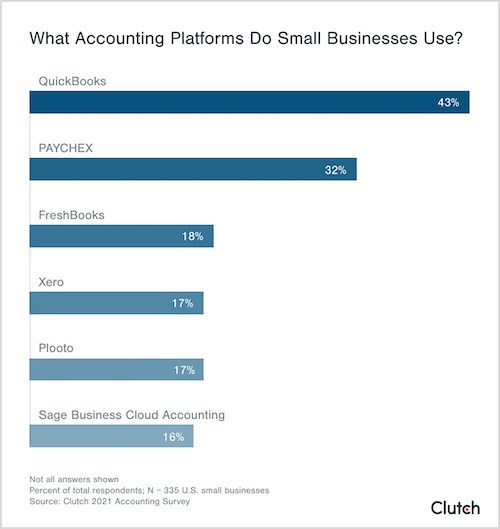Small businesses are likely to have in-house accountants in 2021. But small businesses should still consider a number of accounting tips, including keeping personal and business finances separate, deciding between the accrual and cash accounting methods, and selecting the right accounting software. As small businesses grow, they should prepare to outsource some of their accounting needs.
WASHINGTON, March 31, 2021 /PRNewswire/ — Most small businesses (62%) have an in-house accounting team, according to a new report from Clutch, the leading B2B research and reviews firm.
Clutch surveyed small business owners and managers in 2018 and 2021 to learn about their accounting strategies. The data reveals that most businesses have in-house accountants but also recognize the benefits an outsourced accounting team can provide.
Experts say that small businesses should consider the benefits of an in-house accounting team.
“With our own accountant, we are able to be very specific about the tasks that need to be done and the process we prefer,” said Arthur Linuma, president of ISBX, a web and mobile app development company. “We handle lots of sensitive information, so we’d rather rely on an accountant within our organization.”
Small businesses considering in-house accounting will benefit from the personalized services and increased confidentiality.
Outsourcing Accounting Is More Common as Businesses Mature
Forty-nine percent (49%) of small businesses that have been under the same management for 5 years or more have an in-house accounting team. In comparison, 73% of businesses that have been under the same management for less than 1 year have in-house accountants.
Yvonne Chavez, founder and chief executive of Painting Kits, an online painting materials service, says there are 3 factors that motivate outsourcing:
- Accessing expert advice: Accounting consultants have expertise about business accounting, and can help companies navigate complicated situations and maximize their tax return.
- Adhering to compliance requirements: Accounting comes with significant rules, regulations, and penalties for mistakes. Trained specialists can perform accounting services without running afoul of laws and requirements.
- Lowering the cost of accounting: As businesses grow, accounting costs can rise. Hiring, paying, and providing benefits for an in-house accounting team can be a financial burden, and outsourcing removes those costs.
“Outsourcing offers a unique opportunity to obtain accounting assistance from skilled professionals without incurring the additional costs of hiring in-house personnel,” Chavez said.
Small businesses should consider the opportunity to work with experts and save money that outsourcing accounting provides.
Choosing the Right Accounting Software Is Essential
Businesses use different accounting software, including QuickBooks (43%), PAYCHEX (32%), and FreshBooks (17%).
Experts say that small businesses consider user-friendliness and integration when deciding what accounting software to use, and that Sage Business Cloud Accounting is popular for growing businesses.
“Sage has been incredibly stable, and there are no issues with file sizes or limitations as to the number of users,” said Neal Taparia, co-founder of Solitaired, an online solitaire website.
Businesses should consider how specific accounting software will meet their company’s needs.
Read the full report here: https://clutch.co/accounting/resources/small-business-accounting-tips
For questions about the survey or comments on the finding, contact Seamus Roddy at 306425@email4pr.com.
The leading B2B research, ratings, and reviews firm, Clutch connects small and medium businesses with the best-fit agencies, software, or consultants they need to tackle business challenges together and with confidence. Clutch’s methodology compares business service providers and software in a specific market based on verified client reviews, services offered, work quality, and market presence.















